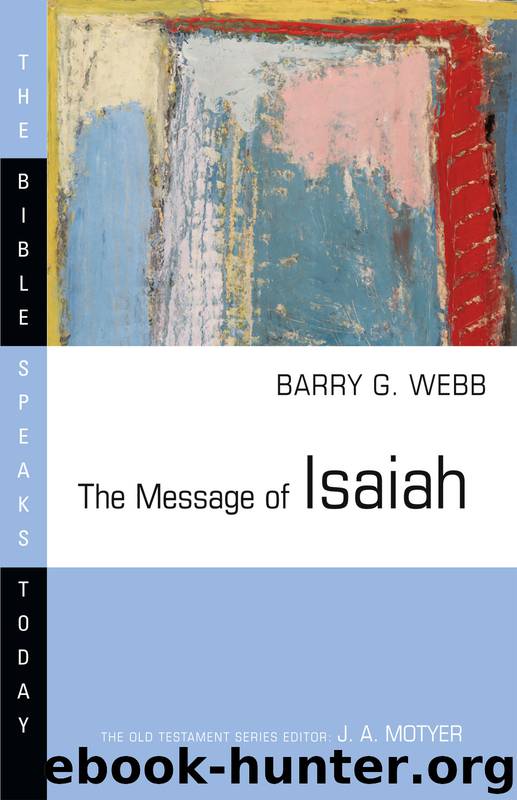The Message of Isaiah by Barry Webb

Author:Barry Webb
Language: eng
Format: epub
Publisher: InterVarsity Press
Published: 2016-03-07T16:00:00+00:00
Envoys from Babylon (39:1–8)
Enter Merodach-Baladan (1), and with him a whole new chapter in Israel’s history. It may be difficult for us (knowing what subsequently happened) to think of Judah and Babylon as allies, but in 712 BC35 it must have seemed the most natural thing in the world. Babylon had been trying to break free of Assyrian domination ever since Tiglath-Pileser III had conquered it in 745 BC, and Merodach-Baladan was the hero of the resistance. He had seized the throne in defiance of Sargon II in 721 BC, and was still clinging to it despite increasing Assyrian pressure. At the same time Hezekiah had become the de facto leader of the anti-Assyrian coalition in southern Palestine. What could make better sense than co-operation between them? It certainly made sense to the Babylonians, who had apparently been watching events in Palestine with keen interest. But would Hezekiah see things their way? There was probably no reason to suspect that he would not, but wisdom indicated that the most opportune moment should be sought for a major initiative of this kind. Hezekiah’s sickness and recovery appeared to present just such a moment.
Envoys were despatched with letters and a gift (1), and they found Hezekiah in high spirits. His strength had returned, his storehouses were full, and his little kingdom was well armed and confident. He was flattered at being courted by one so famous, and did everything in his power to impress his distinguished visitors: There was nothing in his palace or in all his kingdom that Hezekiah did not show them (2). It was all very understandable, but hardly prudent, and even before Isaiah appears on the scene abruptly in verse 3, we have reason to suspect that something has gone badly wrong. Events have moved too quickly. Action that required careful thought and wise counsel has been taken precipitously from wrong motives and, worst of all, God has not been consulted. But it is a hard truth for Hezekiah to accept. We can sense his defensiveness in the tense exchange of verses 3 and 4, and by the end of the chapter he has descended into pure petulance (8). It is a sad fall indeed from the spiritual heights he had attained so recently (38:9–20). Fortunately he bounced back again, as we already know from chapters 36 and 37, where his very first thought is to seek God. He learnt valuable lessons from his fall from grace. But it was tragic none the less, as such events always are; they leave long memories behind them.
Isaiah saw only too clearly that in the long term Babylon would prove to be an enemy rather than a friend. The royal treasure which the Babylonians had seen they would eventually carry off as plunder, and with it the surviving members of the royal family (5–7).36 It was a judgment not so much on Hezekiah’s single lapse as on the kind of faithlessness that it exemplified. The full explanation of why the LORD
Download
This site does not store any files on its server. We only index and link to content provided by other sites. Please contact the content providers to delete copyright contents if any and email us, we'll remove relevant links or contents immediately.
| Hebrew Bible (Old Testament) | Talmud |
| Torah | Zohar |
The Secret Power of Speaking God's Word by Joyce Meyer(2268)
Man's Search for Meaning by Viktor E. Frankl(2268)
Mckeown, Greg - Essentialism: The Disciplined Pursuit of Less by Mckeown Greg(2120)
MOSES THE EGYPTIAN by Jan Assmann(1984)
Unbound by Arlene Stein(1948)
Devil, The by Almond Philip C(1913)
The Complete Dead Sea Scrolls in English (7th Edition) (Penguin Classics) by Geza Vermes(1855)
I Capture the Castle by Dodie Smith(1583)
Schindler's Ark by Thomas Keneally(1524)
The Invisible Wall by Harry Bernstein(1465)
The Gnostic Gospel of St. Thomas by Tau Malachi(1420)
The Bible Doesn't Say That by Dr. Joel M. Hoffman(1377)
The Secret Doctrine of the Kabbalah by Leonora Leet(1273)
The Jewish State by Theodor Herzl(1258)
The Book of Separation by Tova Mirvis(1229)
A History of the Jews by Max I. Dimont(1216)
The Dead Sea Scrolls Bible by Martin G. Abegg(1210)
Political Theology by Carl Schmitt(1194)
Oy!: The Ultimate Book of Jewish Jokes by David Minkoff(1108)
